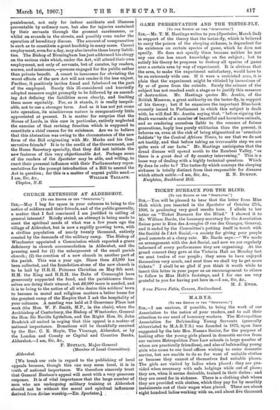AMENDMENT OF THE WORKMEN'S COMPEN- SATION ACT.
[To TRH EDITOR OF TIM "SeserATon.1 Stu,—Whilst the recent extension of Employers' Liability to all classes of the employed, under the Workmen's Com- pensation Act, gives practical recognition to a perfectly legitimate principle, yet its provisions in regard to domestic swvants, in particular, were so hastily adopted by Parliament, and so vaguely worded, that this measure is likely, to become a means of most unjust infliction in many instances where no carelessness on the part of employers may be involved. It would seem as if, under the existing terms of the Act, masters or mistresses may be subjected to severe pecuniary punishment, not only for indoor aocidents and illnesses preventable by ordinary care, but also for injuries sustained by their servants through the grossest carelessness, or whilst on errands in the streets, and possibly even under the operation of hereditary disease. The amount of compensation is such as to constitute a great hardship in many cases. Casual employment, even for a day, may also involve these heavy liabili- ties. The Bishop of Birmingham has just addressed his clergy on the serious risks which, under the Act, will attend their own employment, not only of servants, but of curates, lay readers, nurses, and missioners,—persons engaged for the public rather than private benefit. A resort to insurance for obviating the worst effects of the new Act will not render it the less unjust. Further, it positively invites fraud and falsehood on the part of the employed. Surely this ill-considered and hurriedly adopted measure ought promptly to be followed by an amend- ing Act defining the liabilities more clearly, and limiting them more equitably. For, as it stands, it is really inequit- able, not to use a stronger term. And as it has not yet come into operation, its mischievous nature is comparatively little appreciated at present. It is matter for surprise that the House of Lords, in this ease in particular, entirely neglected the exercise of that revising function which is supposed to constitute a chief reason for its existence. Are we to believe that this abstention was owing to the circumstance of the new form of the Bill originating with Mr. Marks and his Con- servative friends ? It is to the credit of the Government, and the Home Secretary specially, that they did not initiate the new features of this very objectionable Act. Perhaps some of the readers of the Spectator may be able, and willing, to exert their personal influence with their Parliamentary repre- sentatives for the prompt introduction of a Bill to amend the Act in question; for this is a matter of urgent public need.—











































 Previous page
Previous page